Peter MALONE
Saturday, 18 September 2021 19:56
Liability, The
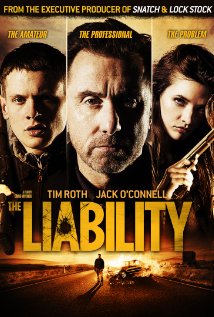
THE LIABILITY
UK, 2012, 82 minutes, Colour.
Jack O' Connell, Tim Roth, Talulah Riley, Peter Mullan, Kierston Wareing.
Directed by Craig.Viveiros.
The Liability is an unusual title for a film. This is one of those gritty British dramas set in the north, portrait of a Northumberland town, homes, the countryside.
The focus of the film is a young man, Adam, played by Jack O’ Connell (‘ 71, Unbroken) who crashes a car and incurs the displeasure of the man who is now living with Adam’s mother (Peter Mullan). Adam discovers secrets, sexual exploitation and violence on his computer.
The main part of the film concerns a commission to a hitman, played rather quietly by Tim Roth, with Adam to accompany him. They go to find a man in the countryside who, it emerges, is also involved in the sex trade. While they kill him, a young woman sees it and they pursue her, she taking their car with the documents. They do a deal with her for an exchange. And things get complicated when the hitman knocks Adam unconscious and ties him up in a warehouse. Adam is naive and does not realise until Roy tells him that he is the real target. While he has been a liability, some kind bond develops between the hitman and Adam.
There is a violent confrontation at the end, not quite as expected, and leaving a future open for Adam as the young woman beckons him to the car.
1. A gritty British film? Themes in characters?
2. Northumberland settings, the towns, homes, the roads, the countryside? The musical score?
3. The title, with reference to Adam? To Peter? To Roy?
4. The grim world, the focus on Adam, his age, lack of education, his personality, rather slow mentally, his appearance and the tattoos? Speeding, crashing the car, sense of irresponsibility? Relationship to his mother? The clashes with Peter, the arguments, his looking at the computer, discovering Peter’s sexual brutality, the shock? Going on the job with Rory?
5. Peter, with Adam’s mother, sexual object? His despising of Adam? his pride in his home, wealth? His anger, brutality on the computer, sexual encounter? His trading in sexual partners? Killing the girl?
6. Roy, his age and experience, his history, not having killed a woman since 1983? The commission, the hitman, being hired? Taking Adam, his response to Adam, the job, finding the man, confronting him, his death, tied to the tree, the plans to dispose of him? Things going wrong, the witness of the girl?
7. The man, seeming victim, his fears, his death? From Latvia? Information about his involvement with sex trading?
8. The girl, her sudden presence, a gun, running, Adam not able to kill her, chase, the attraction? Roy and his handling of the situation? Phoning the girl? The nature of the deal, getting back his case? The build-up for the exchange, tentative, tensions, achievement?
9. Adam, accompanying Roy, the adventure, his talking, his messing up, his being the liability? Driving, the taking of the van, the ousting of the couple? The encounter with the girl?
10. Roy attacking him, tying him up in the building-plant, Adam naive, the girl confronting with the gun, the shootings, her explanation of Roy’s behaviour? Roy admitting it? Roy being shot?
11. Driving, Roy explaining that Adam was the target? His sitting on the seat outside the church, quiet death?
12. Adam going home, Peter and his mother, the sexual encounter, the attack, Peter getting the gun, spurning Adam, going outside, the girl and her shooting Peter? His death? Adam’s bewilderment?
13. The girl, in the car, opening the door, Adam going – to what future?
Published in Movie Reviews
Published in
Movie Reviews
Tagged under
Saturday, 18 September 2021 19:56
Our Man in Marrakesh/ Bang! Bang! You're Dead
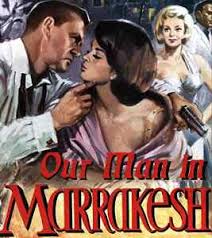
OUR MAN IN MARRAKESH/BANG! BANG! YOUR DEAD__
UK, 1966, 92 minutes, Colour.
Tony Randall, Senta Berger, Herbert Lom, Wilfrid Hyde- White, Terry- Thomas, Gregoire Aslan, John Le Mesurier, Klaus Kinski, Margaret Lee.
Directed by Don Sharp.
Our Man in Marrakesh is a British- American co-production of the 1960s. It was directed by Tasmanian-born Don Sharp who, after a career in acting, moved to direction, many small budget films – his most prominent films being thrillers like Callan and Hennessy, remakes of The Four Feathers and The 39 Steps, as well as the Alistair Mac Lean film, Bear Island.
The film has exotic locations rather beautifully filmed which gives a quality to the film. And it is peopled by quite a number of character actors, many of them popular British actors including a cameo by Terry- Thomas. However, the star is an American, Tony Randall, best known for his role as Oscar in the television version of The Odd Couple. The leading lady is a very attractive Senta Berger. Of interest for film buffs is the presence of Klaus Kinski in his pre-Hertzog days, just as sinister but with, it would seem, a dubbed voice. Herbert Lom and Burt Kwouk are in the film after the success in Pink Panther films.
There is a political background, bribery of members of the United Nations, a mysterious courier bringing a cheque the $2 million leading to a mystery about the courier’s identity, the sudden appearance of an Eton-educated playboy who has to stay in Morocco to enjoy his fortunate (Terry- Thomas) and a final climactic fight and shootout.
1. British style comedy drama? British character actors? American and European leads?
2. The importance of the locations, Marrakesh, the city itself in the different areas, the desert and mountains, the compounds? The musical score?
3. The blend of the serious, the comic, the spoof of adventures?
4. The narrator, the situation, Casablanca, the bus, the six possible suspects on the bus, their briefcases?
5. The crowd, the killing of Philippe, Casimir and Jonquil, the hiding of the body, transferring it to different hotel rooms?
6. Casimir, sinister, wealthy, manipulative, the vote in the United Nations, his wanting the bribe? Jonquil and the others as his henchman, doing the dirty work, the murders?
7. The group arriving in Marrakesh? Audiences guessing who was the courier? The two British travellers and their alibis? Kyra and her background, glamour, lies? Andrew and his lie about Iran oil, planning a new hotel?
8. The hotel rooms, the body, Andrew and Kyra interactions, not going to the police? The story about Philippe? Kyra and her continually telling stories? The dangers? The truth about Philippe? The dinner at the hotel, the various suspects?
9. The meeting with Casimir, the escape, taking the wrong briefcase, the long chase, over the roofs, getting the car, into the desert after the roadblocks? Encountering Achmed, his truck, the chase through the mountains, getting them to leap out, his own jump, the truck crashing, Jonquil’s thinking they were all dead?
10. Andrew and Kyra, the walk in the desert, the sudden appearance of the warriors, their capture, being taken to the compound, meeting with El Caid, Terry- Thomas’s style? His background, leisure, money, his plan, calling the police?
11. Mr Lillywhite, the suspect, with Casimir, the fact that he was an income tax collector?
12. Fairbrother, the real courier, the set up for the exchange of money and documents?
13. The plan, Casimir anticipating, Andrew and his coming late? Meeting Achmed and his helping? The mixup with the briefcases and the truth?
14. Confrontations, Achmed and his men attacking, the fights, the shootings?
15. This kind of spoof in the era of the early James Bond films?
Published in Movie Reviews
Published in
Movie Reviews
Tagged under
Saturday, 18 September 2021 19:56
Sugar Daddies
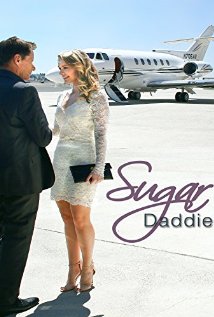
SUGAR DADDIES
US, 2014, 90 minutes, Colour.
Taylor Gildersleeve, Peter Strauss, James C.Burns, Isabella Hoffman, Ashley Mc Carthy, Timothy Brennen, Samantha Robinson, Griffin Freeman.
Directed by Doug Campbell.
“Sugar Daddies” is a euphemism for “dirty old men”. And this is the case here, affluent dirty old men who seem initially charming but prey on young women, setting them up financially, at their sexual beck and call.
This is something of a moralising film, a warning to young women, especially in this case of University students with meagre means, not to get caught up in any kind of prostitution, especially being the equivalent of a call girl for the Sugar Daddies.
As with this kind of film, there is certain amount of prurience as we watch the central character, a decent enough young woman, Kara (Taylor Gildersleeve) who is put off by her roommate’s reliance on the Sugar Daddy to pay her fees and keep her in clothes and jewellery. She is persuaded to go to a club where the men meet, is introduced to a businessman, Grant, who is praised as being a catch. He is played by Peter Strauss, a long way and many years from Rich Man, Poor Man.
Kara’s family is in straitened circumstances after an accident with her father which is not covered by insurance. However, her parents are a decent couple, the father doing auto mechanic repairs. They want Kara to study and graduate. She has been offered an internship with a significant lawyer during her summer break.
When she begins a relationship with Grant, she is at first reluctant, then fairly easily slips into the role of a mistress, with his promises to pay her tuition as well as her father’s medical fees. She goes along with this, alienating her student boyfriend when he discovers the truth.
But one of the points being made is that these young women either don’t have a moral anchor, no discernment between what is right in what is wrong, claiming that they are adults, doing nothing wrong and can make their own choices, or they have a moral anchor which they ignore more and more. This becomes the case with Kara.
There are some contrivances in the plot, Grant giving Kara a new car and her not paying attention and bumping into another vehicle, asking her father to repair it and his discovering that Grant owns the car, leading to a confrontation with his daughter, and with Grant. She asserts her independence although she is caught up in Grant’s fantasies, especially sexual highs through asphyxiation.
She refuses to leave her father’s birthday party and Grant cuts off her off. She succumbs to Grant again, but when he invites her and a friend to go together to his mansion and the friend gives her a drug, she is sick, finds that Grant has asphyxiated her friend and his loyal assistant has disposed of the body.
The film becomes melodramatic – perhaps because it is to serve as a warning for young women who might be contemplating such behaviour and it is reminding them of the dire consequences possible. Kara has a GPS which she has turned off but fortunately, turns it on again, phones her father as she is abducted by Grant’s assistant, her father follows her and there is a last-minute saving Kara from being injected with a deadly drug. They go to the police, Grant trying to escape in his private plane when he is arrested.
The film does what it intends to do, leading us into this seeming highlife, highlighting its attractiveness, then indicating the consequences and the repercussions for these choices.
Published in Movie Reviews
Published in
Movie Reviews
Tagged under
Saturday, 18 September 2021 19:56
Emperor's New Clothes, The/ 2015

THE EMPEROR’S NEW CLOTHES
UK, 2015, 101 minutes, Colour.
Russell Brand.
Directed by Michael Winterbottom.
Everyone knows the story of the Emperor’s new clothes, a tale by Hans Christian Andersen. Just in case there are some in the audience who do not know the story, Russell Brand narrates it at the opening of this documentary with visuals of the inauguration of a London Lord Mayor with all its mediaeval pomp and circumstances, costumes and decor.
Russell Brand is a clever comedian, drawing on his Essex background and the town of Gray, keeping his accent in his comedy roles, looking distinctive, let alone his long hair and beard, reminding some of his fans of Jesus images. Perhaps he is living up to this image here when he goes on a vigorous campaign against capitalists, especially the banking chiefs responsible for the economic crisis of 2008, their criminal behaviour, its being covered up, and the enormous bonuses that they continue to take each year without recriminations or any seeming conscience.
Someone in the local audience objected to being spoken down to, condescended to by a British show business millionaire. Someone else said there was nothing new, that he was expecting fresh insights. There were more opinion is rather than facts.
It is not that kind of documentary. Rather, it is a documentary of protest and indictment, akin to those made by Michael Moore, like Bowling for Columbine, Fahrenheit 911, Sicko. Even those who do not like Moore or Brand, might have to admit that even if half of what they were exposing is true and accurate, this is both appalling and alarming.
Brand takes us to his own town, his growing up there, ordinary life, poverty, the disabled, and takes us on a tour, meeting old friends, giving his documentary some grounding in reality. But soon he is naming names, driving a van around London with placards calling for the apprehension of some of the banking chiefs, showing them in television clips, their claiming to do everything for members of their boards and the shareholders, yet refusing to comment on the millions that they have accrued each year in salary and bonus. Other entrepreneurs get their mention and criticism, including Rupert Murdoch. In one scene, two minibuses are filled with black men and women wearing masks indicating the faces of the billionaires of the world, all in two vehicles.
At the same time, while Russell Brand is talking direct to camera with his characteristic accent, his intense look, his social concern, there are many interviews with ordinary English men and women who find it difficult to make ends meet, who work hard, many jobs, our carers, suffer from physical and mental disabilities. He notes that it would take several hundred years of their ordinary work to gain the amount of money that some of the bankers are given in their bonus.
In many ways, the film is preaching to the converted, but it serves as a rallying point, arousing disgust in its audience for those plutocrats who seem oblivious of what they have done and of how the other, not half, but most, live.
Interspersed amongst the denunciations and the interviews with the hard-pressed, are snippets from David Cameron and his speeches and a kind of visual chorus from Chancellor, George Osborne, highlighting that “we are all in this together”.
At the end, Brand, rather speedily, goes through some of the things that could be done to bring some kind of Justice, especially in the distribution of wealth, appropriate taxing of the millionaires and billionaires and the consequences for ordinary people and for society. (Brand does note that he, in fact, it is one of the millionaires.)
In many ways this film is preaching to the converted. It may make some converts because of its naming and shaming technique and providing information that is not always noticed by the general public. A glance at the Internet Movie Database shows nine bloggers, seven in favour, two against – and the heading of one entertainingly negative: Worthless Celebrity Parasite Tells Proles How To Change The World
The film is rather well put together, the combination of Russell Brands descriptions, exhortations, the touch of preaching, along with a huge range of visuals, documentary style, interviews, clips from the media. It has been directed by Michael Winterbottom, a prolific British director from the last 20 years, at least one film every year, a range of award-winning documentaries on such themes as Guantánamo as well as a succession of entertaining films of many genres, including variations on Thomas Hardy works, Jude, The Claim, Trishna.
Later in the day, this reviewer attended a book launch of a collection of articles and reflections by Frank Brennan SJ, Amplifying That Still Small Voice, who mentioned that he had being impressed by a phrase from judge and Royal Commissioner, Hal Wootten, that changes in our world are made by “little nudgers”. In the film, Russell Brand is giving a rather big nudge to stir us little nudgers.
Published in Movie Reviews
Published in
Movie Reviews
Tagged under
Saturday, 18 September 2021 19:56
Prophecy: Uprising, The
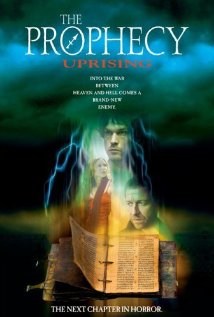
THE PROPHECY: UPRISING
US, 2005, 88 minutes, Colour.
John Light, Sean Pertwee, Kari Wuhrer, Jason London, Doug Bradley, Stephen Billington.
Directed by Joel Soisson.
In 1995, writer-director, Gregory Widen, made the first of The Prophecy series. It was one of those films which speculated about the incarnation of Satan on earth, taking over the world, his rebellion against God and rebellion against him. It had a strong cast of human and angel characters, led by Christopher Walken.
With the popularity of the first film, there was a series of sequels, the latter sequels made for straight-to-video and DVD, which capitalised on variations on the theme of angels, evil, confrontations with humans.
This particular film is the fourth in the series, focusing on a mysterious book which writes its own letters in flames, is sought after by a Romanian Orthodox priest who dies, is taken by a young woman who works in the church, who tries to discover more about the book and the incarnation of the rebel angel against Satan, Belial.
The film was shot in Romania, in the city of Bucharest, very effective in its visualising of the city, its public buildings, as well as its slum areas. Since the book is hidden in a monastery in Romania, there are a number of people in the cast from that country but the cast is led by Sean Pertwee as a corrupt police officer who harasses drug dealers and takes their money and who betrayed his parents to the comments regime in the past. Kari Wuhrer is his sister, the woman who is found the book. Also in the cast, in this film and its sequel, is John Light, an English actor who portrays Satan incarnate.
The film and its alleged theology are all in the vein of using Scriptures and ancient texts for some angelic and satanic hocus-pocus, or presented quite seriously. The film was directed by Joel Soissons, who wrote a number of the Prophecy films as well as some of the Dracula series.
1. The Prophecy series, origins, the developments of sequels? The sequel to this film?
2. Production values, Romanian locations, the city of Bucharest, the views, buildings, churches and monasteries, resorts, squalid areas, slums, police precincts? The atmospheric use of the locations? The musical score?
3. The religious presuppositions? The role of Satan, rebellion against God, incarnate in the world? Belial and his revolt against Satan? Also incarnate? Conflict on earth? The nature of the angels, Simon only in light and in voice, not incarnate? The nature of incarnation, Belial transitioning from one body to another, killing the previous character, removing the heart?
4. Ancient books, the Book of Revelation, allegedly unfinished, for God to dictate more, about the end of the world, the burning letters appearing in the book? Its power, the protection of the cross? In the monastery, the priest, his prayer, going to the basement, with the pick, the wall, gaining the book, the letters appearing, his fear, his pills, his death? Allison and her work in the church, finding the dead man, taking the book?
5. The background of the Communist regime, the terror, the secret police, the torture mansion, the flashbacks and the killings, Dani and Allison, their parents, betrayal, torture and death? The massacres and the torturer killing himself?
6. Dani, police, threatening the vagrant in the street, the pursuit, the threat with the knife, taking the money? Later discovering the body, with no heart, the police investigation, John Reigert arriving, Interpol, the fact that he had killed the vagrant?
7. The further deaths, the priest, the woman in the park and her being taken over, the undertaker, the religious trainee and his being interrogated, the detective, Laurel, and his becoming Belial?
8. Dani, his role in the police, edgy personality, living in London, return home, with the detectives, Laurel and Hardy, with John, the clashes, his anger, and becoming more mysterious, his disappearance and not going to his home?
9. John, Satan incarnate, Interpol? Searching for the book? Belial and his revolt against him? The police work, with Dani, the antagonism, Dani realising the truth? His killing the vagrant? His wanting to find Allison? To protect the book?
10. Allison, the background, the death of her parents, alienation from Dani? Working in the church, finding the dead priest, finding the book, taking it, her being apprehensive, phoning her friend for information about Belial? Her sketching the mansion facade? The taxi ride? The pursuit by Belial in Laurel’s form? The pursuit by Dani and John?
11. The confrontation in the mansion, Allison and hallucinations? The confrontation by Laurel/Belial, Dani shooting him, unable to shoot himself, Allison shooting them both?
12. Allison and the book, Satan satisfied, the destruction of Belial? Open to a sequel?
Published in Movie Reviews
Published in
Movie Reviews
Tagged under
Saturday, 18 September 2021 19:56
Largo Winch
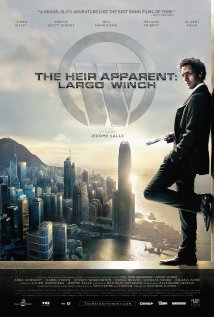
LARGO WINCH
France, 2008, 108 minutes, Colour.
Tomer Sisley, Kristin Scott Thomas, Miki Manojlovic, Melanie Thierry, Gilbert Melki, Karel Roden, Steven Waddington, Anne Consigny, Benedict Wong.
Directed by Jerome Salle.
Largo Winch is based on a series of comics by Belgian authors Van Hamme and Franq. The series has been adapted for the screen by director Jerome Salle, director of Anthony Zimmer and its English-language remake, The Tourist, with Johnny Depp and Angelina Jolie. He also directed the sequel to Largo Winch.
The central character is an orphan from Eastern Europe adopted by a financier and brought up by foster parents. When his father is murdered, the issue of the ownership of the company arises – in Hong Kong.
Tomer Sisley, a German actor, portrays Largo Winch in both films. Here he is supported by Kristin Scott Thomas as the vice president of the company who is involved in some dealings against Largo. There is a range of international cast for the members of the company as well as others hired to get rid of Largo.
Ultimately, Largo succeeds and inherits the company – to be dramatised in the sequel.
1. The title, based on comic strips? The treatment, comic book style, realistic?
2. International atmosphere, Hong Kong, the Balkans, Brazil? The international cast?
3. Expectations, Largo Winch as a character, hero? The villains?
4. The framing, the boat, the killing, the diver? The company, inheritance?
5. Winch, going to Eastern Europe, selecting the orphans, Largo as a little boy, the others, the foster parents, leaving the children, the growing up, scenes of play, at home, styles? Logo developing as a character, emerging as an adult?
6. The issues of companies, death, inheritance, the business world, competition, the Board? Plans, wealth and development?
7. Largo in Brazil, his age, life, the encounter with the girl, helping her, the sexual encounter – and her being seen later, the letter and tearing it up? Brazil, prison, drugs, his escape?
8. Largo and his return, tone, his character, appearance, meeting with the board, the presence of Ann Ferguson, her role, the business plans, the meetings, the buying shares, ownership, the double dealing?
9. Rivalry, the encounter with Goran, the story of the children, the father in the past? The confrontation, Goran’s death?
10. The members of the board, Ann Ferguson and her role, the meeting with the shareholders, her speech, the film and the different background and had recorded voice, exposé, failure?
11. Largo and confrontations, the British and Stephan, the Chinese and William Kwan?
12. The success, Largo Winch’s new role, quiet by the water, the child, playing? The inheritance – and the move towards a sequel?
Published in Movie Reviews
Published in
Movie Reviews
Tagged under
Saturday, 18 September 2021 19:56
Prophecy: Forsaken, The

THE PROPHECY: FORSAKEN
US, 2005, 75 minutes, Colour.
Kari Wuhrer, Jason Scott Lee, John Light, Jason London, Tony Todd.
Directed by Joel Soisson.
The Prophecy: Forsaken is really an epilogue to The Prophecy: Uprising – and they were made back to back in Bucharest.
The film opens with a brief visual summary of the previous film.
Once again, the Bucharest locations have an advantage, with the heroine, Allison, going back again to the mansion in the previous film. This is a story about Allison who was entrusted with the Lexicon in the previous film.
This time she is being pursued by an incarnate angel from the Thrones, Stark, played by Tony Todd who has appeared in a number of horror films and was the Candyman. He is suitably sinister and threatening. He uses an offsider, a hitman played by Jason Scott Lee (who played a priest in the Dracula series). He is commissioned to kill Allison and attempts to kill her several times but is attracted to her and saves her – to the anger of Stark. The hitman, Dylan, shoots himself but Stark revives him to continue on his mission, Dylan bringing Allison to Stark’s presence.
All this is expected material. And then John Reigert, again played by John Light, appears and Allison asks his help since he saved her in the previous film. However, he is not interested, wanting the apocalypse to happen so that he can take people to hell.
Then Simon, voiced by Jason London in previous films, appears, one of the angels of light – and it emerges that Allison has a strong connection to him and her possibility of saving the world.
Once again, the film was written and directed by Joel Soisson. But it plays like an episode rather than a full film. It is simply an epilogue to the previous films and is to be considered as part of The Prophecy: Uprising.
Published in Movie Reviews
Published in
Movie Reviews
Tagged under
Saturday, 18 September 2021 19:56
Spy
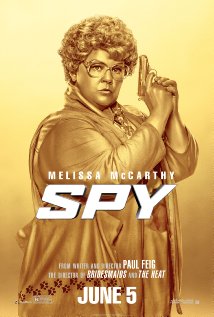
SPY
US, 2015, 120 minutes, Colour.
Melissa Mc Carthy, Jude Law, Rose Byrne, Jason Statham, Miranda Hart, Bobby Cannavale, Peter Serafinowicz, Morena Baccarin, Alison Janney, 50 Cent Jackson.
Directed by Paul Feig.
Definitely for those who enjoy Melissa Mc Carthy comedies. Perhaps not for those who do not enjoy raucous comedies with more than a touch of the silly!
Over the last few years, a new genre of films has emerged from Hollywood, the Melissa Mc Carthy comedy. While she had been appearing on television and in films are many years, it was her supporting role in Bridesmaids that brought her to wide attention. Since then she has appeared in a number of comedies including Identity Thief, The Heat with Sandra Bullock, Tammy (and an effective serious role in St Vincent).
So, what are the conventions of the genre? First of all there is the presence of the Melissa Mc Carthy herself, a physically large and extroverted self, getting tangled in all kinds of situations, her being generally in control; she has a way with words, is not embarrassed by crassness, can argue her way out of most situations, a mixture of clown and comedienne. This served her well in her scenes in Bridesmaids and her policewoman in The Heat, both directed by Paul Feig.
Perhaps it is every stars dream to be in a James Bond film. And this is what Spy is, some serious espionage sequences as well as a sendup. Jude Law gets his opportunity early in the film to do the James Bond thing – and resume it later in the film. However, unlike Bond, he is able to have an earpiece which connects him directly to his CIA monitor, Susan Cooper (Mc Carthy in her more demure moments) who also has on screen, images of his presence (this time in Bulgaria) and she is able to guide him, warn him about attackers. And, in her heart of hearts, she is in love with him, helped at first by his taking her to dinner on return, then, despite his saying she is the best, his presenting her with a comedy necklace.
The comedy starts when Law, confronting a villain, sneezes and shoots him unintentionally. When the continued case goes awry, Susan, who is acknowledged as very knowledgeable with background information, offers to go into the field as an agent, at first reluctantly considered by her supervisor, Alison Janney yet again giving one of her sardonic performances, who then decides to let her go because she is not known to the target. The target is the daughter of the dead criminal, played with haughty pretensions to being an aristocrat by Rose Byrne.
Into the mix comes Jason Statham, right out of his many, many action shows, but this time being spoofed himself by himself, an extreme chauvinist who thinks of Susan as a tea lady, boastful about his own progress but proving himself as the film goes on to be a bit dumb and dumber.
Also into the mix comes British television comedian, Miranda Hart, very tall to Susan’s lack of height, which means they are a bit of an enjoyable Laurel and Hardy act in their various exploits, which also includes the surprising presence of wrapper 50 Cents Jackson..
With different disguises and with different identities, Susan shows herself to be adept as an agent, yet giving herself away at times so that a bomb can be diffused, but then ingratiating herself into Rose Byrne’s attention, even claiming to be a bodyguard appointed secretly by her father. The thing is that Rose Byrne knows the location of a nuclear bomb and is ready to sell it to the highest bidder, through the agency of a high-flying gambler, played by Bobby Cannavale.
All the major players get into the final mix on the estate of a luxurious Hungarian mansion – after a lot of mixups, double agents, serious situations, especially Susan being able to land an out-of-control plane, and some farcical tangles. Some very funny moments and characterisations but, as might be expected from past Melissa Mc Carthy comedies, it is both raucous and raunchy.
1. A spoof of espionage films? Spy heroes? James Bond?
2. Melissa Mc Carthy comedy? Her presence, style, jokes, repartee, her physical size? Raucous and raunchy?
3. An international story, the CIA, Bulgaria, Hungary? The locations? The cast? The musical score?
4. The initial situation, Jude Law as a spy, suave, at the party, going to the basement, the confrontation with the villain, action, his sneeze, Susan listening, her equipment, her GPS, the death of the villain? The situation that only he knew this location of the bomb?
5. Susan in herself, top of her class, her friendship with Nancy, years of work, the skills, sitting in the office, offering information, her superior and reliance on her? Cutting remarks? With Fine, in love, the meal, flirting, the comic necklace? Her reaction? His praise of her?
6. Fine, the new mission, the confrontation, the camera view, his being shot, Susan upset? Appearing with Rayna, the sexual relationship, the betrayal, the poison? In prison, his help, the confrontation?
7. Rick Ford, at the meeting, British, tough, being rude to Susan, stupid in himself? His turning up in various situations? Interventions? Mistakes, confronting Susan? On the international scene?
8. Susan, going on the mission, not being known? The comic identities? The background? Finding Rayna, reporting? Nancy listening? Undercover, seeing Rick Ford and the bag change with the bomb, chasing him, being identified, yelling, the explosion? Her being noted?
9. New identity, tracking Rose, address, the poison on the drink, saving Rose, rose and her snobbery? Her guards? The friendship with Susan?
10. The plane, the betrayal, the shootings, Susan flying the plane, landing?
11. The boss, present, new identities? Susan pretending to be the bodyguard, going into action, confronting the other bodyguards? The spinning the story?
12. Karen, glamour, at the CIA office, going on holiday, with Susan and Nancy, their envy? Seeing her in Budapest? The betrayal, her being shot?
13. Rayna, her associates, selling the bomb? De Luca, his role, selling, gambling, Susan intruding into the gambling?
14. Nancy, appearing in Budapest, the dangers, her awkwardness, 50 Cents and going on stage, the kiss? The joke about 50 Cents?
15. Going to the mansion, De Luca, Susan the cell, Fine coming to free her? The woman to buy the bomb? Her being killed? The thwarting of the sale? The shootout, Fine appearing, Rick Ford and his turning up, getting the boat – and not knowing they were on a lake?
16. Aldo and his flirtatious behaviour, turning up, in prison, his accent and being British?
17. The happy ending, Rayna and her disdain? Susan and Nancy, the further work?
17. A tongue-in-cheek spoof with the touch of the raucous and the raunchy?
Published in Movie Reviews
Published in
Movie Reviews
Tagged under
Saturday, 18 September 2021 19:56
Woman in Gold
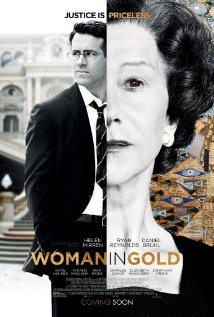
WOMAN IN GOLD
UK, 2015, 109 minutes, Colour.
Helen Mirren, Ryan Reynolds, Daniel Bruhl, Katie Holmes, Tatiana Maslany, Max Irons, Charles Dance, Antje Trauer, Elizabeth Mc Govern, Jonathan Pryce, Frances Fisher, Moritz Bleibtreu, Tom Schilling, Allan Corduner, Henry Goodman.
Directed by Simon Curtis.
Woman in Gold is both interesting and entertaining.
In fact, this could be called two films in one, the first in the present, the story of Maria Altman and the painting, Woman in Gold, by Klimt, and the issue of restitution to families of stolen art which was stolen by the Nazis. The second story is in the flashbacks to the 1930s and 1940s, to Maria Altman’s family, the paging of Adele Bloch Bauer by Gustave Klimt and its confiscation by the Nazis.
While the story has its own drama and tensions, one of the principal drawing powers is the presence of Helen Mirren in the central role. It is almost 50 years since she began her career, an early appearance in the Australian film Age of Consent, the story of Norman Lindsay. Since then she has been a constant presence on stage, on television (particularly in the Prime Suspect series) and in many films, with a climax and her many awards, including the Oscar, for the 2006 portrait of Elizabeth, The Queen. Since then she has drawn audiences in such films as The Hundred Foot Journey as well as the spoof action films, Red and Red 2.
Maria Altman is certainly one of her most persuasive roles, an Austrian Jew, a child in the 1920s, marrying in the late 30s, experiencing, with her parents, the Nazi attacks and fleeing with her husband (in a quite dramatic and tense section of the film), settling in the United States, in Los Angeles and living there for many decades.
The film opens with the death of Maria’s sister and the discovery of the will of Adele and her wishes about the portrait by Klimt and its going to the Austrian gallery, Belvedere. In 1998, Maria wonders whether there is some claim to the painting and consults the son of a friend (who is, in fact, the grandson of the composer, Schoenberg, who had fled to the United States). He is played, unexpectedly, by Ryan Reynolds, starting with some diffidence, mixed motivation for helping, a change of heart, especially when he visits the Holocaust Memorial in Vienna and finally realises his Jewish heritage and his ancestors having to flee, committed to the cause despite setbacks over the years and finally acting on the courage of his convictions.
This makes the story in the present very interesting, with visits to Austria and an application to the specially constituted Committee for the Restitution of Art, Maria breaking a promise to herself never to return to Vienna and going to a conference and making an appeal for the Klimt portrait and other paintings which were stolen.
When the application is refused, there seems to be nothing else to do, but Randy Schoenberg discovers a catalogue for The Belvedere, printed in America, which gives a legal opportunity for the case to be heard, not only in a local court but all the way to the Supreme Court (with entertaining cameos by Elizabeth Mc Govern as the first judge and Jonathan Pryce as the Chief Justice).
There is great antagonism for representatives of the Belvedere, but support from a young Austrian journalist, who discovered his father was a Nazi, Hubertus (Daniel Bruhl).
The flashbacks are very well integrated into the story, the focus on Maria (with Helen Mirren’s powerful ability to indicate what her character is thinking and feeling, in close-up, without any words) and her remembering her past. The cumulative effect is that we are taken back into the heart of the family, the painting of the portrait, the character of Adele, her love for her nieces, Maria and the close bond with her parents, the joy of her wedding, her parents realising that they would have to stay, Maria’s escape with her husband.
This is a film that can be widely recommended to audiences who like a good story, some drama and find performances.
1. The title? The portrait by Klimt? Interest, entertainment?
2. Two stories combined, intercut? Dramatic effect?
3. The two periods, 1930s and 1940s, the 1990s onwards? The different styles, decor, costumes, atmosphere? The musical score?
4. The perspective on the Nazis, treatment of the Jews, persecution, humiliation, confiscation of artworks and property? The Holocaust and imprisonment and deaths? A rather calmer telling of the story, audiences identifying with the character and sharing the horror?
5. The opening funeral, the Jewish emphasis, Maria’s presence, her dead sister, the papers, the boxes in the house? The will, Klimt’s painting, ownership rights, restitution? Maria talking to her friend, mother of a lawyer, contact with the lawyer?
6. Randy sought out by Maria, tentatively visiting her, against the job and the situation, his wife, the child, her pregnancy? Financial issues? The failure in Pasadena? The interview, Sherman, his listening, impressed by Schoenberg’s music, offering him the job? Randy and Maria’s request, wary, looking through the papers, the cash value of the painting, asking Sherman and his being granted a week? Maria not wanting to go?
7. The flight to Vienna, the visuals of the city, the landmarks, the beauty of the city in itself? Seeing the city through Maria’s eyes, her reluctance to return, looking from the plane, remembering the past, the challenge in her memories to be true, the effect?
8. The meeting with the Austrian authorities, casual response, politeness? The committee and its listening to requests? Constituted for restitution of artworks?
9. The meeting with Hubertus, in himself, journalist, his magazine, his wanting to help, friendly, the story of his father and discovering he was a Nazi? His wanting to make amends? The investigations, supplying information, the contact and revealing the documents? His being present as support?
10. The conference, the committee for restitution, the speakers, Maria and her making the case, not being accepted?
11. Randy, his experience, the law, the possibilities? His attentiveness to legal detail? Going to the Holocaust Memorial, going aside to weep, the effect of realising his ancestry and the consequences?
12. His return home, explanations to his wife, her support, her pregnancy, wanting him to do the right thing, shocked at his resigning from the company?
13. Maria, strong character, the memories of her past, living in Los Angeles, her Germanic manner, the Jewish tradition? Her shop, wanting a new washing machine?
14. The memories from the past, the way that they were intercut, Maria’s memories? The painting, Klimt and Adele posing, her character, beauty, her husband, not having any children, a love for her nieces? The necklace, the gift to Maria, her place in society, Jewish? Her early death? Her will – and its later being contested as a will, her death, her husband and true ownership?
15. The 1930s, Maria and her love for her parents, as a couple, his playing the cello, the Nazi persecutions? The wedding, the joy, the son-in-law singing opera, the dancing? Maria and her love for her husband?
16. The time for escape, the brother warning Maria’s father, his leaving Austria? The father, staying, considered a dreamer? Too late to escape? For Maria to go? The sadness of the farewell? America, the language of a new country?
17. The drama of the escape, the friend owing the father and prepared to drive the couple, the plan to take the plane to Cologne? Going to the pharmacy, accompanied by the guard? Escape from the shop, the chase, people reporting them, others helping? The car, to the airport? Maria improvising about the reason for going to Cologne, the opera? The waiting, the two men being taken? In the plane, leaving, her weeping, going to the United States? A strong woman, her loving husband?
18. The personalities of the Austrian authorities, their reluctance to part with the portrait, the nationalism? The months passing, the Belvedere guide published in the United States, grounds for an American claim? Sherman and his not wanting to take a greater risk? The opposition, the Austrian official coming, the lawyer and his skills? The details of the hearing? The judge, her listening, her decision in favour of Maria?
19. The Estee Lauder heir, his discussions with Maria, offer to buy the painting, his gallery? Maria’s refusal? The later reconsidering?
20. Being allowed to go to the Supreme Court? The Austrian presence? the lawyer? Washington, the hearings, Randy and his inexperience, a sympathetic response of the Chief Justice, his comments and quips? Maria and waiting for the news? The victory?
21. The verdict, Maria not wanting to take it further? Not wanting to go to Austria again? The clash with Randy?
22. His determination, the birth of the baby, his wife?
23. Going to Vienna, the appeal for arbitration, the hearings, the Belvedere personnel present? Hubertus and his support? Maria’s arrival? The discussions, the decisions of the arbitrators? The Austrian and his pleading with Maria, her refusal?
24. The aftermath, the financial implications, the paintings going to the United States? Maria, her philanthropy? Dying at 94? Randy, his family, his practice and restitution of art?
25. The finale, the Maria going into her past, the various characters in her life, looking at her, her joy and the joy in her presence?
Published in Movie Reviews
Published in
Movie Reviews
Tagged under
Saturday, 18 September 2021 19:56
Hold that Ghost
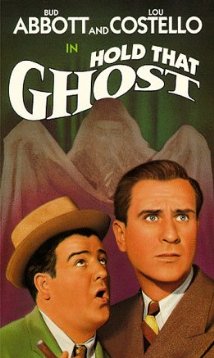
HOLD THAT GHOST
US, 1941, 86 minutes, Black and white.
Bud Abbott, Lou Costello, Richard Carlson, Joan Davis, Mischa Auer, Evelyn Ankers, Marc Lawrence, Shemp Howard, Russell Hicks, Ted Lewis, the Andrews Sisters.
Directed by Arthur Lubin.
1940 and 1941 were important years for the film careers of Bud Abbott and Lou Costello. They were introduced in 1940 as supporting players in One Night in the Tropics, a screwball romantic comedy. They had previously played vaudeville and were successful on radio. They brought their comic style and patter to Universal Studios who gave them a contract and very quickly made a number of films in 1941, including this film.
They played garage attendants who have an opportunity to work as waiters in a fashionable club, with a fair amount of slapstick comedy and verbal argument. The club is really an opportunity for Ted Lewis to lead his band, singing in his idiosyncratic style and introduce a ballad by the Andrews Sisters. The sisters appeared also in Buck Privates and Buck Privates In the Navy at the same time.
The club also introduces the theme of criminals which comes to a head when they are back at their service station work and have some tangles with a criminal called Moose Matson who is cornered by the police and dies in police fire. The irony is that his will states that whoever was with him at his death will inherit everything. That includes a mysterious, now abandoned, luxury hotel and resort, with gaming facilities.
Other criminals want the money and decide to follow the heroes to find it in the house. The assassin is played by Marc Lawrence, a criminal in many films, even up to his sinister role in the comedy, Foul Play, 1978.
A variety of guests goes in the bus and has to stop at the hotel, leading to a variation on ghosts and haunted house films.
The supporting cast is better than average, including Richard Carlson as a very, very serious-mind doctor who finds romance with Evelyn Ankers. Also in the cast is comedienne Joan Davies, later in a variety of comedies including If You New Susie. She has a lot of comedy routines with Lou Costello.
It is a dark night, there is a storm, there is a sinister basement, there are many, many rooms which with levers can transform from bedrooms to gambling rooms, Lou Costello experiencing all this with Bud Abbott’s disbelief.
As with their many routines, there is another one about Bud Abbott cheating Lou Costello of money. And there are various arguments and slapstick situations.
This one is possibly more amusing than many of the others.
Published in Movie Reviews
Published in
Movie Reviews
Tagged under